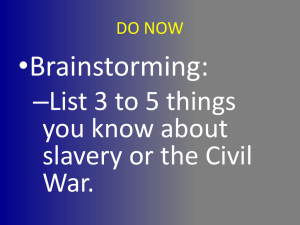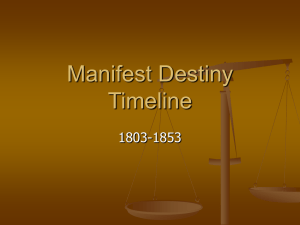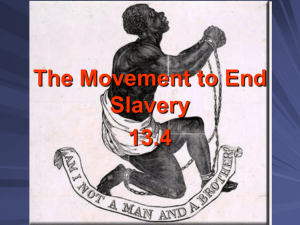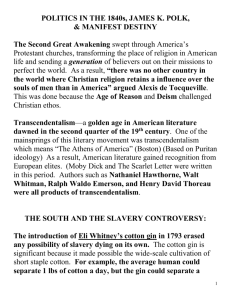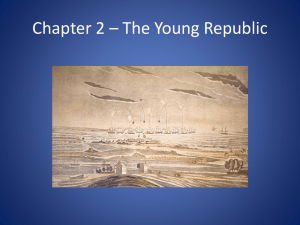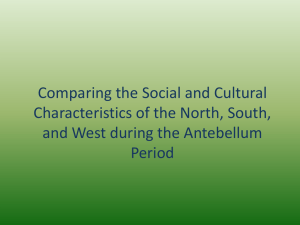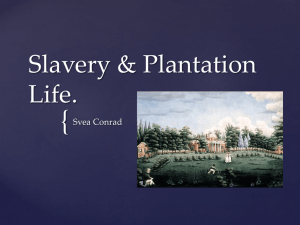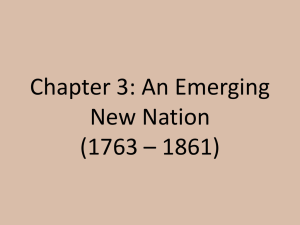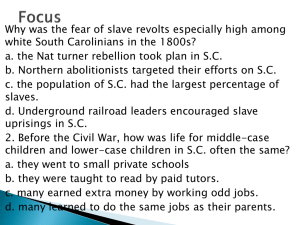Unit 5 Notes
advertisement
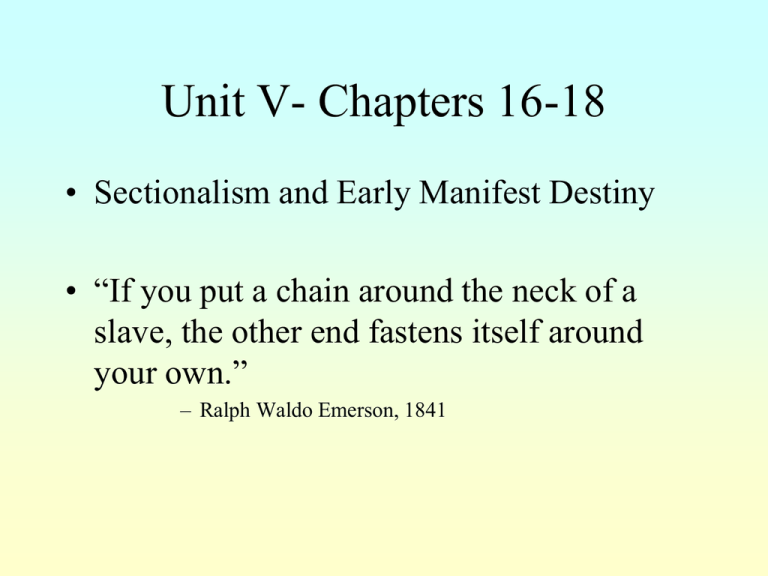
Unit V- Chapters 16-18 • Sectionalism and Early Manifest Destiny • “If you put a chain around the neck of a slave, the other end fastens itself around your own.” – Ralph Waldo Emerson, 1841 Early America • 1781-1793 – Tobacco, rice and sugar dominated the South’s economy • 1793: The invention of the cotton gin by Eli Whitney Cotton is King! •33 million U.S. population, 4 million slaves in the South •75% of Britain’s cotton came from the South by 1860 •1/2 of U.S. exports were from cotton •More money invested in slaves than land and tools---$2 billion •More millionaires in the South than the North •75% of the cotton harvest was done by plantations with 10 or more slaves. •Slave population grew from natural reproduction (1860) •The invention of the Cotton Gin reinvigorated slavery •Planter Aristocracy dominated society and politics in the South Cotton Production Cotton is King! • • North and South both reaped rewards of cotton trade South produced upwards of 50% of world’s cotton supply British were dependent upon the south; (1/5) of its population drew livelihood from cotton manufacturing Get rich quick! • KING COTTON! • • • Planter Aristocracy – Oligarchy – Front Rank Statesmen – Private vs. public – Behind the times – Monopolistic and undemocratic – Dangerous dependence Cotton is King • German and Irish Immigrants avoided the South because they could not compete with slave labor • 1/4th of white southerners owned slaves (3/4 of this had <10 slaves) • 0.6% slave owners had >100 slaves • Most southerners didn’t own slaves because they could not afford them ($1200) (75%) – Subsistence farmers – ‘snobocracy’ • “Poor white trash” – Hillbillies, crackers and clay eaters • “Mountain Whites” were pro-Union Emancipated Slave Treatment • Some slaves in the South were able to purchase their freedom • Free blacks usually moved to the North where they were generally disliked by whites despite the fact that many of those whites were abolitionists – – – – Not politically sympathetic Northerners liked the race but not the individual Hated by Irish and German immigrants Discriminated against by many northerners, including abolitionists Plantation Life • Because slaves were such a valuable resource they were usually spared dangerous working assignments • Many plantation slaves were forced to separate from their families (small plantations in the upper south) Cotton is King • Slaves fought against the institution of slavery in many ways: – – – – – Slowing down the work pace Sabotaging expensive equipment Stealing Fleeing to the North Armed insurrection (least successful) • Martin Delaney proposes that blacks be re-colonized to Africa Recolonization • Martin Delaney– Supported the idea of recolonizing blacks back to Africa • Liberia • Monrovia Early Abolitionism • Theodore Dwight Weld • American Slavery As It is – Described slavery life – Effective argument against slavery; influenced Harriet Beecher Stowe’s Uncle Tom’s Cabin Radical Abolitionism • William Lloyd Garrison > • The Liberator – Upset both Southerners and Northerners – Called for Northern secession • David Walker (Black Abolitionist) > • Appeal to the Colored Citizens of the World – A bloody end to white supremacy Radical Abolitionism • Frederick Douglass – Narrative of the Life of Frederick Douglass • Mulatto • Escaped slave • Looked to politics to end the ‘peculiar institution’ • Liberty Party in 1840; Free Soil Party in 1848 ABOLITIONISTS RESPOND Denounced by Abolitionists Harriet Beecher Stowe’s, Uncle Tom’s Cabin is published Abolitionists refuse to enforce the law Underground Railroad becomes more active SOUTHERNERS RESPOND Southerners threatened secession and war Believed it should be enforced because the Constitution protects property and Federal law is over State law. 5th Amendment Supremacy Clause John Tyler • Member of the Whig party – Hated Andrew Jackson – Thought he was a dictator – Cabinet: Henry Clay, Zachary Taylor, Robert Walker, Daniel Webster, Millard Fillmore – Entire cabinet (except Daniel Webster) resigns during his Presidency State of Maine • The British and Americans dispute the border – Aroostook War breaks out (Webster-Ashburton treaty) – Ends in a compromise that gave both sides territory State of Maine • The British and Americans dispute the border – The treaty also settled the border dispute In Minnesota – Essentially cuts the disputed territory in half •James K. Polk, Democrat • President from 1845 to 1849 •Responsible for the Manifest Destiny •Expansionist •Acquired the Oregon Territory from Great Britain in 1846 •54’, 40’ or Fight •49th Parallel •Mexican War acquired Mexican Cession and completed U.S. control of the continent from ocean to ocean Picture/Polk •James K. Polk, Democrat • Re-establish the independent treasury •Reduce the protective tariff •Annex California •Acquired the Oregon Territory from Great Britain in 1846 •54’, 40’ or Fight •49th Parallel Picture/Polk Manifest Destiny • Oregon fever and manifest destiny allowed a push for Texas without threatening the Union over slavery • Polk won presidency in 1844 on a platform of annexing Texas, taking all of Oregon, gaining California and lowering tariffs American Progress A painting representing John Sullivan’s 1845 idea of manifest destiny Americans began moving into Texas in the 1820’s and brought their slaves with them. War fought by Texans against Mexico because they believed their rights had been violated. Won by Texans in 1836 and requests to enter the U.S. Texas War of Independence Texas War of Independence President Jackson and Van Buren refused to recognize Texas statehood because of slavery. Texas became its own country with Sam Houston president, 1836 to 1845. Mexico never recognized the independence of Texas. Texas entered as a U.S. state in 1845. Mexico vowed if Texas became part of the U.S., this would be an act of war. One cause of the war with Mexico in 1846. Texas War of Independence1 Manifest Destiny • Polk negotiated a treaty for ½ of Oregon, 49th parallel • After failing to buy CA, Polk provoked Mexico into attacking US troops near the Rio Grande • Public support faded even though the US won every major battle • Treaty of Guadalupe Hidalgo gave Mexico $15 million for CA, NM, and recognition of TX annexation • Abraham Lincoln introduces “spot” resolutions • US Gov’t must tell us where American blood was shed Manifest Destiny • Wilmot Proviso to ban slavery split Democrats • Free Soil movement opposed the spread of slavery and was endorsed by Frederick Douglas • Whigs and Taylor won 1848 election because Democrats were split and Free Soil party cost them a win in NY (Lewis Cass) Debates of 1850 Most intense debate in U.S. History •John C. Calhoun •North should honor the Constitution and enforce the Fugitive Slave Law •South wanted California •threatened to secede from U.S. •U.S. should have two Presidents--one from the North and one for the South •Daniel Webster •Henry Clay •The Great Compromiser, with John C. Calhoun, Daniel Webster and Stephen Douglas, propose this compromise. •Secession is impractical & impossible •How would we split the land? •The military? •Compromise at all cost •Preserve the Union Comp of 1850 Manifest Destiny • Gold Rush caused a crisis as CA sought statehood • Most people who went to California for the Gold Rush were lawless men • Taylor’s death allowed Clay’s Compromise of 1850: – CA admitted as a free state – popular sovereignty for the New Mexico, Utah territories – abolishment of slave trade, not slavery in Wash. DC – disputed land given to NM, TX paid for it – new Fugitive Slave Act was alarming to the North Manifest Destiny • Fugitive Slave Act Provisions: – accused runaways denied a jury trial and the right to testify in their defense – judges paid more for guilty verdicts – fines, prison, or work as a slave catcher • Several northern states passed personal-liberty laws to undermine the FSA Manifest Destiny • 1844 foreign relations – US and China sign the Treaty of Wanghia • 1850 foreign relations • American Adventurer William Walker seizes Nicaragua • Southern adventurers attempt to buy Cuba but are denied • Known as Ostend Manifesto – They later try and seize it by force – Cuba already had many slaves, sugar and was close to the US – Northerners protest ends the Commodore Matthew Perry Election of 1852 • Whig party splits due to the argument over slavery – This marks the end of the Whig party • Franklin Pierce wins the election (Democrat) (Defeats Winfield Scott) • 1852 foreign relations • Matthew Perry is sent to Japan to demand that they participate in trade with the United States – Sent by Pierce President Franklin Pierce The Kansas-Nebraska Act and the Rise of New Parties • Stephen Douglas’ Kansas-Nebraska Act: – – – – divide Nebraska territory into Kansas and Nebraska popular sovereignty to decide slavery issue repeal Missouri Compromise hoped to facilitate a northern transcontinental RR • Republican and Know-Nothing Parties competed to replace Whigs • Popular Sovereignty led to civil war in Kansas – – – – fraudulent election LeCompton govt. Sack of Lawrence Pottawatomie massacre Know-Nothing Flag


